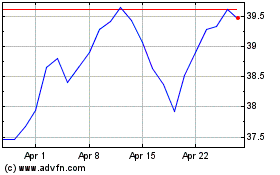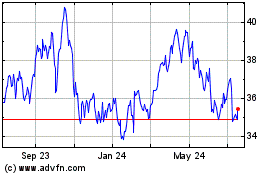BP Posts First Quarterly Loss in More Than a Year -- 2nd Update
February 06 2018 - 5:41AM
Dow Jones News
By Sarah Kent
LONDON-- BP PLC posted its first quarterly loss since mid-2016
on Tuesday, largely because of charges from the 2010 Gulf of Mexico
blowout and the U.S. tax overhaul, but 2017 proved its most
profitable year overall since oil prices crashed.
A relatively strong set of fourth-quarter profits for BP were
effectively wiped out by a nearly $1 billion paper loss related to
U.S. corporate-tax changes and a $1.7 billion charge from
unexpectedly high settlements from the Deepwater Horizon accident.
The company recorded a $583 million loss for the fourth
quarter.
However, BP says the U.S. tax overhaul enacted late in 2017 will
be positive in the long term. The company says its Gulf of Mexico
costs are manageable and are largely wrapping up.
The British oil-and-gas company was buoyed by a recovering crude
market during a fourth quarter when oil prices averaged over $61 a
barrel--up 24% from the same period in 2016.
For all of 2017, BP said its replacement cost profit--a number
analogous to the net income that U.S. oil companies report--was
$2.8 billion, compared with a loss of $1 billion in 2016. It was
BP's first annual profit since 2014.
The company reported stronger production and healthy earnings
from its refining and marketing division.
BP Chief Financial Officer Brian Gilvary said the company
expects to cover its spending and dividend with cash from
operations at $50 a barrel this year. The company is targeting a
break-even price of $35 to $40 a barrel by 2021.
"This time last year we were talking about $60 a barrel, so we
have a pretty good trajectory," Mr. Gilvary said.
The company's net debt rose 6% to $37.8 billion in 2017 compared
with a year earlier, although it was on a downward trajectory in
the fourth quarter compared with the three previous months.
BP's break-even oil price in 2018 is more like $56 a barrel,
said Jason Gammel, oil-industry analyst at investment bank
Jefferies, who wrote that his outlook for the company was "mildly
positive."
BP's share price dropped over 2% in London trading Tuesday
morning, though losses narrowed to 1.3% later. It was largely a
result of the negative sentiment that has driven a stock selloff
around the world and BP was down less than the FTSE100 and rival
Royal Dutch Shell PLC.
BP's earnings are the latest in a choppy reporting season for
big oil companies. Shell's net profit tripled last year, but a drop
off in cash flow in the fourth quarter raised concerns among
investors. U.S. rivals Exxon and Chevron both missed earnings
expectations and suffered a substantial sell off as a result.
BP is still trying to convince investors it can regain its
position among the elite tier of big energy companies. The company
has lagged its peers since the fatal Deepwater Horizon explosion
and oil spill in the Gulf of Mexico eight years ago. The disaster
forced the company to sell off billions of dollars in assets to
help finance a bill to cover clean up and legal costs that has
ballooned to more than $60 billion.
BP outlined a path last February to boost profits and return to
its former size by the early 2020s.
The company's return to profit last year reflects early success
in delivering on that plan. Excluding its share in Rosneft, BP's
production rose 12% in 2017 and in a sign of growing financial
resilience, the company began a share buyback program in the fourth
quarter.
BP Chief Executive Bob Dudley described 2017 as "one of the
strongest years in BP's recent history," adding that the company
was increasingly confident it could continue to deliver growth.
Write to Sarah Kent at sarah.kent@wsj.com
(END) Dow Jones Newswires
February 06, 2018 05:26 ET (10:26 GMT)
Copyright (c) 2018 Dow Jones & Company, Inc.
BP (NYSE:BP)
Historical Stock Chart
From Mar 2024 to Apr 2024

BP (NYSE:BP)
Historical Stock Chart
From Apr 2023 to Apr 2024
